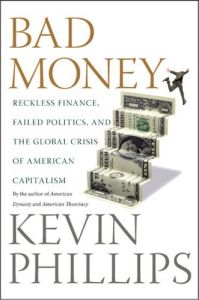Join getAbstract to access the summary!

Join getAbstract to access the summary!
Kevin Phillips
Bad Money
Reckless Finance, Failed Politics, and the Global Crisis of American Capitalism
Viking, 2008
What's inside?
A devastating critique of U.S. politics and economics in the supposed twilight of the American empire.
Recommendation
Many readers already admire Kevin Phillips’s previous books, with their incisive analysis of U.S. politics. In this treatise, published just before the 2008 presidential election, his main concerns are the dangerous dominance of the financial sector in the U.S. economy and the fiscal implications of peak oil. Phillips covers many other hazards, from securitization to the real estate bubble. He provides historical background to explain modern financial circumstances, whacks both the Bush and Clinton administrations, and offers his take on everything from imperial England to the efficient market hypothesis. After he explains how and why the U.S. is teetering dangerously on the brink of disaster, getAbstract is relieved to report that Phillips also offers some ideas about how it might rescue itself by going back to strong manufacturing, solid education and better regulations. This seems to be a fairly hasty overview of bad times, but the author can see beyond the immediate storm to the possibility of a brighter day.
Summary
About the Author
Kevin Phillips has been a political and economic commentator for more than three decades. A former White House strategist, he has been a regular contributor to The Los Angeles Times and National Public Radio. He has written for Harper’s and TIME, and is the author of 10 books.


















Comment on this summary